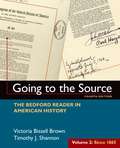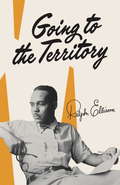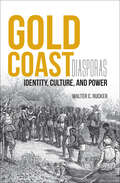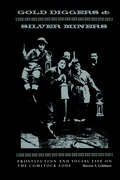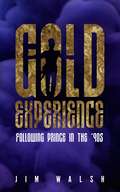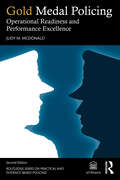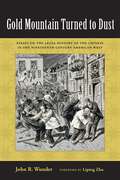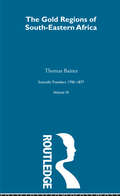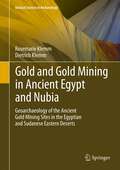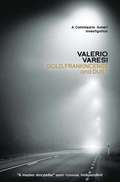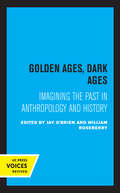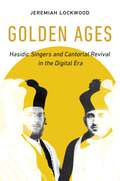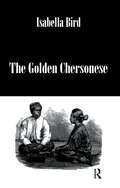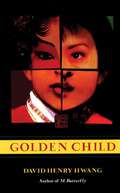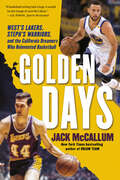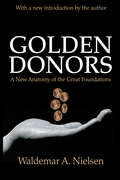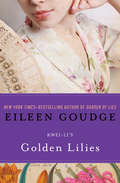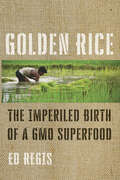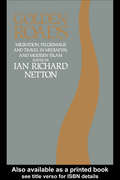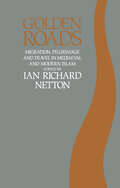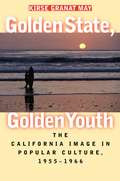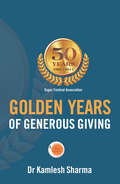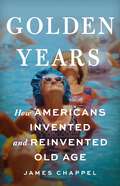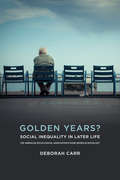- Table View
- List View
Going to the Source: Since 1865 (Fourth Edition)
by Victoria Bissell Brown Timothy J. ShannonGoing to the Source combines a rich diversity of primary and secondary sources with in-depth instructions for how to use each type of source. Mirroring the chronology of the U.S. history survey, each of the main chapters familiarizes students with a single type of source -- from personal letters to political cartoons--while focusing on an intriguing historical episode such as the Cherokee Removal or the 1894 Pullman Strike. A capstone chapter in each volume prompts students to synthesize information on a single topic from a variety of source types. The wide range of topics and sources across 28 chapters provide students with all they need to become fully engaged with America’s history.
Going to the Territory
by Ralph EllisonThe work of one of the most formidable figures in American intellectual life."-- Washington Post Book WorldThe seventeen essays collected in this volume prove that Ralph Ellison was not only one of America's most dazzlingly innovative novelists but perhaps also our most perceptive and iconoclastic commentator on matters of literature, culture, and race. In Going to the Territory, Ellison provides us with dramatically fresh readings of William Faulkner and Richard Wright, along with new perspectives on the music of Duke Ellington and the art of Romare Bearden. He analyzes the subversive quality of black laughter, the mythic underpinnings of his masterpiece Invisible Man, and the extent to which America's national identity rests on the contributions of African Americans. Erudite, humane, and resounding with humor and common sense, the result is essential Ellison.From the Trade Paperback edition.
Gold Coast Diasporas: Identity, Culture, And Power (Blacks in the Diaspora)
by Walter C. RuckerAlthough they came from distinct polities and peoples who spoke different languages, slaves from the African Gold Coast were collectively identified by Europeans as "Coromantee" or "Mina." Why these ethnic labels were embraced and how they were utilized by enslaved Africans to develop new group identities is the subject of Walter C. Rucker's absorbing study. Rucker examines the social and political factors that contributed to the creation of New World ethnic identities and assesses the ways displaced Gold Coast Africans used familiar ideas about power as a means of understanding, defining, and resisting oppression. He explains how performing Coromantee and Mina identity involved a common set of concerns and the creation of the ideological weapons necessary to resist the slavocracy. These weapons included obeah powders, charms, and potions; the evolution of "peasant" consciousness and the ennoblement of common people; increasingly aggressive displays of masculinity; and the empowerment of women as leaders, spiritualists, and warriors, all of which marked sharp breaks or reformulations of patterns in their Gold Coast past.
Gold Diggers and Silver Miners: Prostitution and Social Life on the Comstock Lode (Women And Culture Series)
by Marion S. GoldmanIn 1859 high grade silver bullion was discovered on the Comstock Lode. In a twinkling, Virginia City was transformed into a brawling boom town perched on a mountain of silver. Twenty years later it virtually disappeared, leaving behind played-out mines, tumbled-down shanties, and memories of those who sought their fortunes on the lode. The fortune seekers were many: miners and madams, confidence men and dance hall girls. The fast life was as stratified as any proper community, ranging from expensively kept women to prostitutes living in cribs. Laura Fair, an elite member of the demimonde, shot her protector and, after a spectacular trial, retired to live modestly in San Francisco. Jessie Lester made a small fortune as a madam while middle rank prostitutes such as Julia Bulette died in debt. At the lowest end of scale were "celestial damsels," nameless slave women brought from China to minister to the needs of Chinese workers. Chronicling it all was the cynical and lascivious pen of Alf Doten, writer, editor, and bon vivant. In Gold Diggers and Silver Miners, sociologist Marion S. Goldman provides a detailed account of prostitution on the Comstock Lode. By considering sexual commerce in a community limited in space and time, she explores general relationships between prostitution and society, shedding light on sociological questions of importance today.
Gold Experience: Following Prince in the '90s
by Jim WalshThroughout the 1990s, Prince feuded with his record label, Warner Bros., over his rights as an independent recording artist—and made some of the most brilliant music of his career. During that time, Jim Walsh covered Prince for the St. Paul Pioneer Press and wrote about him passionately, thoughtfully, exhaustively. Here, in real time, is that coverage: a clip-by-clip look back at Prince in the &‘90s. Walsh&’s newly unearthed interviews, essays, columns, and reviews make Gold Experience an essential slice of history for fans, scholars, and latecomers to the Minneapolis-born musical genius Prince Rogers Nelson (June 7, 1958–April 21, 2016).Join Walsh at the 1994 NBA All-Star game after party and release bash for the single &“The Most Beautiful Girl in the World.&” Accompany him to the after-hours clubs Erotic City, Glam Slam, and, of course, Paisley Park. Meet Prince&’s wife and bandmate Mayte (and while you&’re at it, take in the wedding and reception). Enjoy a two-hour sit-down interview with Prince. Explore Prince&’s veganism, talk to fans in line for a Target Center show, preview the &“Jam of the Year&” concert and check in at the after party. The passions and influences, from Mozart to funk godfather Larry Graham; the gigs and the Paisley Park garage sale; Walsh&’s open letter to the artist and his reflections on religion and spirituality. This is Prince as few have seen him, reported as only Jim Walsh can: a portrait of the artist from a dizzying array of angles, captured in living color for all time.
Gold Medal Policing: Operational Readiness and Performance Excellence (Routledge Series on Practical and Evidence-Based Policing)
by Judy M. McDonaldThis straightforward, easy-to-understand textbook inspires tools for improving job performance, productivity, and morale in law enforcement. The groundbreaking first edition of Gold Medal Policing, inspired by work with Olympic athletes, confirmed the importance of mental readiness in frontline policing excellence. Partnerships with policing and related fields positioned Gold Medal Policing principles across recruitment, multilevel training, web-based learning, and field assessment.The second edition consolidates two decades of peer-reviewed research and training, reflecting new trends, lessons, contemporary issues, and proven tools. Drawing on insights from frontline officers recognized for their excellence, including coach officers, it introduces an Operational Readiness Framework rooted in scientific principles. This framework systematically assesses physical, technical, and mental readiness, creating a detailed police-specific profile. A comprehensive literature review informs current police preparedness practices. Mental readiness is upheld to strict, measurable standards, akin to traditional physical and technical readiness. Best practices from exceptional officers are isolated, and operational benchmarks and strategies are established. The ultimate result is to empower officers to excel in the practice of their profession.Gold Medal Policing is indispensable for law enforcement leaders, scholars, students, and aspiring officers.Questions about the research? Contact the author Judy McDonald at judy.mcdonald@uottawa.ca
Gold Mountain Turned to Dust: Essays on the Legal History of the Chinese in the Nineteenth-Century American West
by John R. WunderSome half million Chinese immigrants settled in the American West in the nineteenth century. In spite of their vital contributions to the economy in gold mining, railroad construction, the founding of small businesses, and land reclamation, the Chinese were targets of systematic political discrimination and widespread violence. This legal history of the Chinese experience in the American West, based on the author&’s lifetime of research in legal sources all over the West—from California to Montana to New Mexico—serves as a basic account of the legal treatment of Chinese immigrants in the West.The first two essays deal with anti-Chinese racial violence and judicial discrimination. The remainder of the book examines legal precedents and judicial doctrines derived from Chinese cases in specific western states. The Chinese, Wunder shows, used the American legal system to protect their rights and test a variety of legal doctrines, making vital contributions to the legal history of the American West.
Gold Region:Sci Tra 1791-1877
by Thomas BainesThis book contains a preface, a memoir and an obituary notice, which together provide a good account of Thomas Baines' life. It includes advertisements aimed especially at would-be emigrants to South Africa. The book is an important document of colonial history and South African history.
Gold and Gold Mining in Ancient Egypt and Nubia
by Dietrich Klemm Rosemarie KlemmThe book presents the historical evolution of gold mining activities in the Egyptian and Nubian Desert (Sudan) from about 4000 BC until the Early Islamic Period (~800-1350 AD), subdivided into the main classical epochs including the Early Dynastic - Old and Middle Kingdoms - New Kingdom (including Kushitic) - Ptolemaic - Roman and Early Islamic. It is illustrated with many informative colour images, maps and drawings. An up to date comprehensive geological introduction gives a general overview on the gold production zones in the Eastern Desert of Egypt and northern (Nubian) Sudan, including the various formation processes of the gold bearing quartz veins mined in these ancient periods. The more than 250 gold production sites presented, are described both, from their archaeological (as far as surface inventory is concerned) and geological environmental conditions, resulting in an evolution scheme of prospection and mining methods within the main periods of mining activities. The book offers for the first time a complete catalogue of the many gold production sites in Egypt and Nubia under geological and archaeological aspects. It provides information about the importance of gold for the Pharaohs and the spectacular gold rush in Early Arab times.
Gold, Frankincense and Dust: A Commissario Soneri Investigation
by Valerio VaresiParma. A multiple pile-up occurs on the autostrada into the city. A truck transporting cattle skids off the road. Dozens of cows and bulls go on the rampage, injured and crazed. In the chaos, the burned body of a young woman is found at the side of the road. Her death has no apparent link to the carnage. Commissario Soneri is assigned the case. It is a welcome distraction: his mercurial lover Angela has decided to pursue other options, leaving him even more morose than usual. The dead woman is identified as Nina Iliescu, a Romanian immigrant whose beauty had enchanted a string of wealthy lovers. Temptress, muse, angel - she was all things to all men. Her murder conceals a crime and a sacrilege, and even in death she has a surprise waiting for Soneri.
Gold, Frankincense and Dust: A Commissario Soneri Investigation
by Valerio VaresiParma. A multiple pile-up occurs on the autostrada into the city. A truck transporting cattle skids off the road. Dozens of cows and bulls go on the rampage, injured and crazed. In the chaos, the burned body of a young woman is found at the side of the road. Her death has no apparent link to the carnage. Commissario Soneri is assigned the case. It is a welcome distraction: his mercurial lover Angela has decided to pursue other options, leaving him even more morose than usual. The dead woman is identified as Nina Iliescu, a Romanian immigrant whose beauty had enchanted a string of wealthy lovers. Temptress, muse, angel - she was all things to all men. Her murder conceals a crime and a sacrilege, and even in death she has a surprise waiting for Soneri.
Golden Ages, Dark Ages: Imagining the Past in Anthropology and History
by Jay O’Brien William RoseberryThis title is part of UC Press's Voices Revived program, which commemorates University of California Press’s mission to seek out and cultivate the brightest minds and give them voice, reach, and impact. Drawing on a backlist dating to 1893, Voices Revived makes high-quality, peer-reviewed scholarship accessible once again using print-on-demand technology. This title was originally published in 1991.
Golden Ages: Hasidic Singers and Cantorial Revival in the Digital Era (University of California Series in Jewish History and Cultures #3)
by Jeremiah LockwoodA free ebook version of this title is available through Luminos, University of California Press’s Open Access publishing program. Visit www.luminosoa.org to learn more.Golden Ages is an ethnographic study of young singers in the contemporary Brooklyn Hasidic community who base their aesthetic explorations of the culturally intimate space of prayer on the gramophone-era cantorial golden age. Jeremiah Lockwood proposes a view of their work as a nonconforming social practice that calls upon the sounds and structures of Jewish sacred musical heritage to disrupt the aesthetics and power hierarchies of their conservative community, defying institutional authority and pushing at normative boundaries of sacred and secular. Beyond its role as a desirable art form, golden age cantorial music offers aspiring Hasidic singers a form of Jewish cultural productivity in which artistic excellence, maverick outsider status, and sacred authority are aligned.
Golden Chersonese: And The Way Thither (classic Reprint)
by BirdFirst published in 2004. Routledge is an imprint of Taylor & Francis, an informa company.
Golden Child
by David Henry HwangA new play by the author of M. Butterfly which premieres on Broadway in April. Golden Child travels across time and place from contemporary America to mainland China in 1918 and depicts the challenges of a culture in transition to the influences of western civilization.
Golden Days: West's Lakers, Steph's Warriors, and the California Dreamers Who Reinvented Basketball
by Jack MccallumThe bestselling author of Dream Team tells the interconnected stories of the NBA champion Golden State Warriors and the early-1970s Los Angeles Lakers, two extraordinary teams playing in extraordinary times and linked by one extraordinary man: Jerry West. During their 1971–72 championship season, the L.A. Lakers won thirty-three games in a row, a streak that still stands as the longest and greatest in the history of American professional sports. It was a run of uninterrupted dominance that predated by decades the overwhelming firepower of today’s Warriors, a revolutionary team whose recent seasons include some record-threatening win streaks of their own. In Golden Days, acclaimed sports journalist Jack McCallum uses these two teams—the Jerry West/Wilt Chamberlain/Elgin Baylor Lakers and the Stephen Curry/Kevin Durant/Draymond Green Warriors—to trace the dynamic history of the National Basketball Association, which for much of the last half-century has marched memorably through the state of California. Tying together the two strands of McCallum’s story is Hall of Famer West, the ferociously competitive Laker guard who later became one of the key architects of the Warriors. With “the Logo” as his guide, McCallum takes us deep into the locker rooms and front offices of these two era-defining teams, leveraging the access and authority he has amassed over his forty-year career to create a picture of the cultural juggernaut that the NBA has become. Featuring up-close-and-personal portraits of some of the biggest names in basketball history, from the larger-than-life Wilt Chamberlain to the innovative Warriors coach Steve Kerr to the transcendent duo of Curry and Durant, Golden Days is a history, not just of a changing sport, but a changing America, as seen through the prism of two teams that ruled the league during times of violence and political turmoil—the Charles Manson murders and the athlete-activist in the age of Trump among the narrative backdrops. In the end, McCallum’s book leaves an indelible portrait of West, the man who lived, played, and worked through it all—and who remains, on the cusp of his eightieth birthday, one of the most vital, complicated, and compelling figures in all of sports.Advance praise for Golden Days “With his classic eye for detail and deadpan wit, Jack McCallum connects two of the greatest teams in sports history through the endlessly fascinating persona of Jerry West. McCallum manages to unearth new details about some of the giants of the game, while shining a light on overlooked figures such as Elgin Baylor, delivering an original, fascinating, and breezy read.”—Zach Lowe, senior writer, ESPN “I spent some of the 2016–17 season working as a consultant for the Golden State Warriors, but even I didn’t know every detail of how this championship team came together. Golden Days breaks that all down and shows how the Warriors have revolutionized basketball.”—Steve Nash, two-time MVP
Golden Donors: A New Anatomy of the Great Foundations
by Waldemar A. NielsenThe world of the golden donors - the rich and influential philanthropic foundations - is quite likely the least known and yet most pervasive of all the invisible money and power networks in America. Nielsen explores the 36 largest of the 22,000 currently active foundations. He takes the reader inside each of the giants to analyze its people, policies, and performance. From the most famous, Ford and MacArthur, to the most obscure, Mabee and Moody, the author lets in daylight and lets out the bats as well as the butterflies. Golden Donors is a journey through 36 flefdoms, each of which controls upwards of $250 million dollars, beyond the reach of the IRS, in order to encourage medical research, support cultural and artistic endeavors, and not least, to buttress immensely expensive educational institutions. Which of the great foundations in recent years have been spectacular successes and which are failures? Is today's leadership in the third-stream economy equal to the task? Are foundations, seedbeds or killing grounds of new social and political ideas? And what is the federal government, and a variety of administrations, doing to help or harm this new economy? Nielsen provides many surprising and some quite startling answers for the millions of Americans whose lives the golden donors directly or indirectly affect. When Golden Donors first appeared, A. Bartlett Giamatti praised it as an historical guide, a shrewd critique, and an impassioned warning. "This remarkable book on the nation's largest foundations must be ready by anyone concerned with America's unique not-for-profit sector and the quality of our national life." Kingman Brewster saw the book as "a revealing mirror held up to the faces of big philanthropy...a must book for foundation creators and leaders." Thornton F. Bradsahw said, "Golden Donors describes the large American foundations, what they are how they got that way, and wherein lies their strength and their potential. The book is wise, witty, and perceptive - indispensable reading."
Golden Lilies
by Kwei LiCentury-old letters tell a story of timeless love in a vanished countryFirst translated by American scholar Elizabeth Cooper in 1914 and published as My Lady of the Chinese Courtyard, this haunting collection of letters was out of print until discovered by bestselling author Eileen Goudge. In its pages she found the story of Kwei-li, a noblewoman of nineteenth-century China. In rich, elegant detail, Kwei-li writes of passionate love for a man whom she first meets on their wedding day. She navigates the difficulties of homemaking and motherhood, becoming a confident wife as her happy home is threatened by the forces of change that are sweeping the nation. Enhanced with beautiful new illustrations, this is a timeless chronicle of a strong woman&’s struggle against the onset of modernity. This ebook features an illustrated biography of Eileen Goudge including rare photos from the author&’s personal collection.
Golden Rice: The Imperiled Birth of a GMO Superfood
by Ed RegisThe first book to tell the shocking story of Golden Rice, a genetically modified grain that provides essential Vitamin A and can save lives in developing countries—if only they were allowed to grow it.Ordinary white rice is nutrient poor; it consists of carbohydrates and little else. About one million people who subsist on rice become blind or die each year from vitamin A deficiency. Golden Rice, which was developed in the hopes of combatting that problem by a team of European scientists in the late '90s, was genetically modified to provide an essential nutrient that white rice lacks: beta-carotene, which is converted into vitamin A in the body. But twenty years later, this potentially sight- and life-saving miracle food still has not reached the populations most in need—and tens of millions of people in India, China, Bangladesh, and throughout South and Southeast Asia have gone blind or have died waiting. Supporters claim that the twenty-year delay in Golden Rice's introduction is an unconscionable crime against humanity. Critics have countered that the rice is a "hoax," that it is "fool's gold" and "propaganda for the genetic engineering industry." Here, science writer Ed Regis argues that Golden Rice is the world's most controversial, maligned, and misunderstood GMO. Regis tells the story of how the development, growth, and distribution of Golden Rice was delayed and repeatedly derailed by a complex but outdated set of operational guidelines and regulations imposed by the governments and sabotaged by anti-GMO activists in the very nations where the rice is most needed. Writing in a conversational style, Regis separates hyperbole from facts, overturning the myths, distortions, and urban legends about this uniquely promising superfood. Anyone interested in GMOs, social justice, or world hunger will find Golden Rice a compelling, sad, and maddening true-life science tale.
Golden Roads: Migration, Pilgrimage and Travel in Medieval and Modern Islam
by Ian Richard NettonEssays on themes (migration, pilgrimage and travel) as old as Islam itself and integral in the development of a cosmopolitan Islamic social order embracing much of Africa and Eurasia.
Golden Roads: Migration,pilgrimage
by Ian Richard NettonEssays on themes (migration, pilgrimage and travel) as old as Islam itself and integral in the development of a cosmopolitan Islamic social order embracing much of Africa and Eurasia.
Golden State, Golden Youth
by Kirse Granat MaySeen as a land of sunshine and opportunity, the Golden State was a mecca for the post-World War II generation, and dreams of the California good life came to dominate the imagination of many Americans in the 1950s and 1960s. Nowhere was this more evident than in the explosion of California youth images in popular culture. Disneyland, television shows such as The Mickey Mouse Club, Gidget and other beach movies, the music of the Beach Boys--all these broadcast nationwide a lifestyle of carefree, wholesome fun supposedly enjoyed by white, middle-class, suburban young people in California.Tracing the rise of the California teen as a national icon, Kirse May shows how idealized images of a suburban youth culture soothed the nation's postwar nerves while denying racial and urban realities. Unsettling challenges to this mass-mediated picture began to arise in the mid-1960s, however, with the Free Speech Movement's campus revolt in Berkeley and race riots in Watts. In his 1966 campaign for the governorship of California, Ronald Reagan transformed the backlash against the "dangerous" youths who fueled these actions into political triumph. As May notes, Reagan's victory presaged a rising conservatism across the nation.
Golden Years of Generous Giving: Sugar Festival Association – Lautoka - Fiji
by Dr Kamlesh SharmaThe Sugar Festival Association is incorporated under the Charitable Trusts Act (Cap 67) of Fiji. Its main aim is to raise funds for charitable purposes by organising the annual Sugar Festival and undertake projects that benefit the community as a whole. The Lautoka Sugar Festival is one of the largest in Fiji and its origin goes back to early 1961 when the first Festival was organised by the Lautoka Junior Chamber of Commerce (Lautoka Jaycees). The Festival continued as an annual event under the stewardship of Lautoka Jaycees until 1980 when it was announced that the running of the Festival would be handed over to a public committee. This resulted in the establishment of the Sugar Festival Association that is now responsible for organising the annual Festival on the foundation of generous goodwill and commitment of its volunteers and supporters.
Golden Years: How Americans Invented and Reinvented Old Age
by James ChappelAn &“essential&” (The New Republic) account of the history of old age in modern America, showing how we created unprecedented security for some and painful uncertainty for others On farms and in factories, Americans once had little choice but to work until death. As the nation prospered, a new idea was born: the right to a dignified and secure old age. That project has benefited millions, but it remains incomplete—and today it&’s under siege. In Golden Years, historian James Chappel shows how old age first emerged as a distinct stage of life and how it evolved over the last century, shaped by politicians&’ choices, activists&’ demands, medical advancements, and cultural models from utopian novels to The Golden Girls. Only after World War II did government subsidies and employer pensions allow people to retire en masse. Just one generation later, this model crumbled. Older people streamed back into the workforce, and free-market policymakers pushed the burdens of aging back onto older Americans and their families. We now confront an old age mired in contradictions: ever longer lifespans and spiraling health-care costs, 401(k)s and economic precarity, unprecedented opportunity and often disastrous instability. As the population of older Americans grows, Golden Years urges us to look to the past to better understand old age today—and how it could be better tomorrow.
Golden Years?: Social Inequality in Later Life (American Sociological Association's Rose Series)
by Deborah CarrThanks to advances in technology, medicine, Social Security, and Medicare, old age for many Americans is characterized by comfortable retirement, good health, and fulfilling relationships. But there are also millions of people over 65 who struggle with poverty, chronic illness, unsafe housing, social isolation, and mistreatment by their caretakers. What accounts for these disparities among older adults? Sociologist Deborah Carr’s Golden Years? draws insights from multiple disciplines to illuminate the complex ways that socioeconomic status, race, and gender shape the nearly every aspect of older adults’ lives. By focusing on an often-invisible group of vulnerable elders, Golden Years? reveals that disadvantages accumulate across the life course and can diminish the well-being of many. Carr connects research in sociology, psychology, epidemiology, gerontology, and other fields to explore the well-being of older adults. On many indicators of physical health, such as propensity for heart disease or cancer, black seniors fare worse than whites due to lifetimes of exposure to stressors such as economic hardships and racial discrimination and diminished access to health care. In terms of mental health, Carr finds that older women are at higher risk of depression and anxiety than men, yet older men are especially vulnerable to suicide, a result of complex factors including the rigid masculinity expectations placed on this generation of men. Carr finds that older adults’ physical and mental health are also closely associated with their social networks and the neighborhoods in which they live. Even though strong relationships with spouses, families, and friends can moderate some of the health declines associated with aging, women—and especially women of color—are more likely than men to live alone and often cannot afford home health care services, a combination that can be isolating and even fatal. Finally, social inequalities affect the process of dying itself, with white and affluent seniors in a better position to convey their end-of-life preferences and use hospice or palliative care than their disadvantaged peers. Carr cautions that rising economic inequality, the lingering impact of the Great Recession, and escalating rates of obesity and opioid addiction, among other factors, may contribute to even greater disparities between the haves and the have-nots in future cohorts of older adults. She concludes that policies, such as income supplements for the poorest older adults, expanded paid family leave, and universal health care could ameliorate or even reverse some disparities. A comprehensive analysis of the causes and consequences of later-life inequalities, Golden Years? demonstrates the importance of increased awareness, strong public initiatives, and creative community-based programs in ensuring that all Americans have an opportunity to age well.
